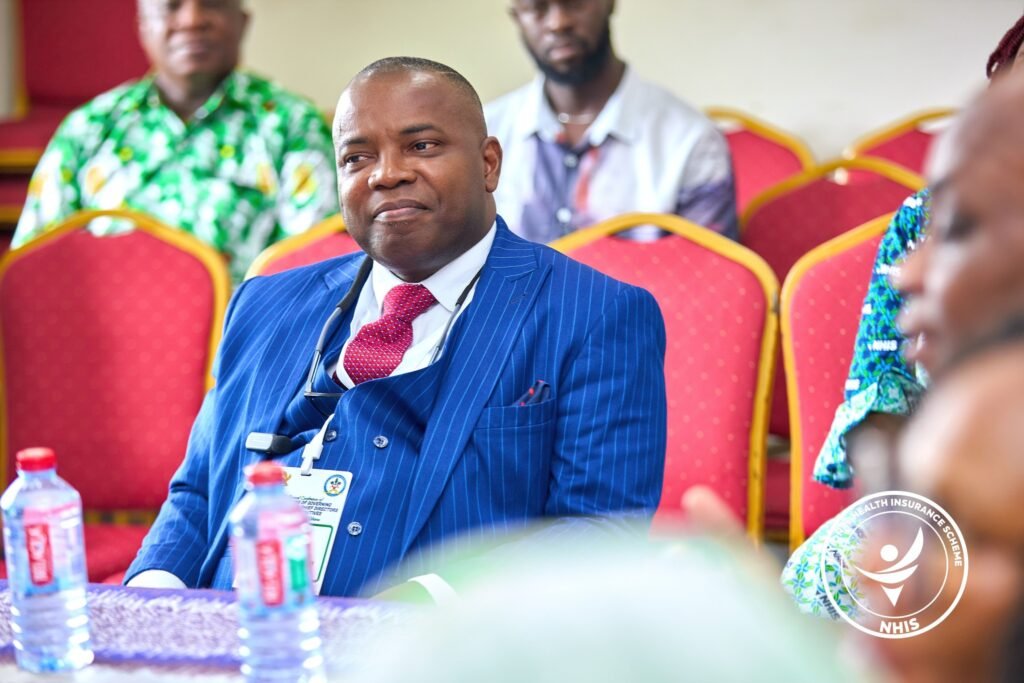The Chief Executive Officer of the National Health Insurance Authority (NHIA), Dr. Victor Asare Bampoe, has embarked on a working visit to assess the impact of recent disruptions in the national electronic health records and hospital management system on National Health Insurance Scheme (NHIS) members and healthcare providers across the country.
The digital platform, which integrates healthcare delivery across hospitals and clinics nationwide, is not owned or managed by the NHIA but remains critical to the Scheme’s daily operations.
The system’s downtime has raised concerns over delays in patient authentication, claims processing, and access to healthcare, prompting Dr. Bampoe’s intervention.
During separate meetings with the management of the Ho Teaching Hospital (HTH) and the NHIA Volta Regional Office in Ho, discussions focused on the operational impact of the disruptions, particularly how they were affecting NHIS members’ access to care and providers’ claims documentation.
The engagement also explored possible short- to medium-term interventions to minimize the disruptions’ effect on health service delivery. Dr. Bampoe’s visit forms part of a broader nationwide effort to familiarize himself with on-the-ground realities since assuming office.
He emphasized his determination not to remain an “armchair Chief Executive” but to engage directly with NHIS members, service providers, and staff to understand their challenges and develop practical, data-driven solutions.
At the Ho Teaching Hospital, Dr. Bampoe and his delegation were welcomed by Dr. Hintermann K. K. Mbroh, the hospital’s Chief Executive, alongside other directors and administrators.

No NHIS Member Should Pay Out of Pocket
Providing an overview of the situation, Dr. Bampoe stated that reports reaching the NHIA indicated that some health facilities were either turning away NHIS members or charging them cash upfront due to their inability to verify membership electronically.
He described the practice as unacceptable and inconsistent with the principles of the NHIS. “We want our members to have a cash-free experience as much as possible, regardless of the challenge,” Dr. Bampoe stressed.
He added that the Authority was working with key partners to explore short-term alternatives to prevent out-of-pocket payments. He said the NHIA was considering deploying additional staff to support affected facilities with manual authentication and claims documentation to prevent service interruptions.
Dr. Bampoe commended the Ho Teaching Hospital for its swift and pragmatic response to the crisis, including manual service authentication and claims documentation processes, which allowed patients to continue accessing care.
He further assured that the NHIA was working closely with the Ministry of Health and other relevant agencies to restore full system functionality as soon as possible. In the interim, the Authority is coordinating with affected facilities to ensure that no NHIS member is denied care, despite the temporary setback.
He expressed appreciation to healthcare professionals for their resilience and dedication during the system downtime, describing their efforts as vital in maintaining public confidence in the National Health Insurance Scheme.

Ho Teaching Hospital’s Interventions
Speaking on behalf of Dr. Mbroh, Mr. George Tetteh, a representative of the hospital’s management, expressed gratitude to Dr. Bampoe for visiting the facility despite his busy schedule. He said the visit was an indication of the NHIA Boss’s commitment to both NHIS members and healthcare providers.
Mr. Tetteh outlined the measures implemented by the hospital to ensure service continuity. He explained that the hospital initially reverted to a manual process and later introduced a temporary fix involving manual entry of client codes into the system. However, when that option failed, the hospital resorted to full manual operations, including paper-based triage, laboratory, diagnosis, and prescription processes.
He said the hospital continues to provide services to all clients with valid NHIS cards. However, verification remains difficult for clients without active cards. “Such clients are given the option to pay out of pocket, though cash payments are not enforced,” Mr. Tetteh explained.
He further assured that despite the disruptions, data integrity and proper documentation are being maintained. The IT claims team is now relying on manually completed forms to process claims, while NHIS-approved medicines continue to be supplied. “We have ensured that distinctions between insured and out-of-pocket services are clearly maintained,” he noted.

Although he acknowledged that waiting times had increased, he said staff were educating and reassuring patients as efforts continue to restore the digital system for smooth and efficient healthcare delivery.
Regional Support and Oversight
The Acting Volta Regional Director of the NHIA, Ms. Susan Chobbah, reaffirmed that her team had been monitoring the situation closely to ensure that no NHIS member was turned away.
She disclosed that she and other regional officials had visited both the Ho Teaching Hospital and Ho Municipal Hospital to assess the situation and provide on-site support.
According to her, the facilities were using a manual 842 process to generate client codes and complete claims forms, which had allowed them to continue serving NHIS members effectively despite the system disruptions.
Dr. Bampoe’s proactive approach has been widely praised as a demonstration of responsive and hands-on leadership, reinforcing public confidence in the NHIA’s commitment to ensuring continuous access to healthcare for all Ghanaians under the Scheme, even in times of operational challenges.
READ ALSO: Economist Sounds Alarm: Ghana’s Overdependence on Imports Threatens Economic Future



















